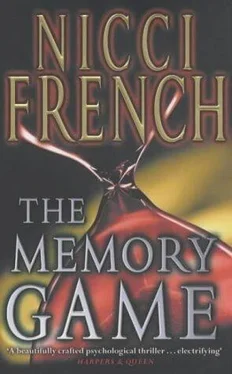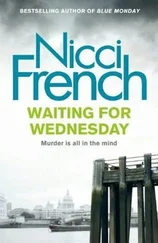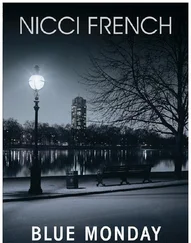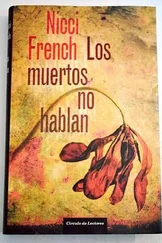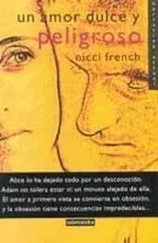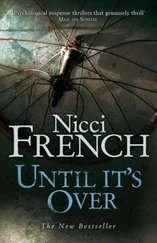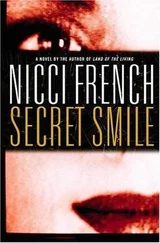Nicci French - The Memory Game
Здесь есть возможность читать онлайн «Nicci French - The Memory Game» весь текст электронной книги совершенно бесплатно (целиком полную версию без сокращений). В некоторых случаях можно слушать аудио, скачать через торрент в формате fb2 и присутствует краткое содержание. Жанр: Триллер, на английском языке. Описание произведения, (предисловие) а так же отзывы посетителей доступны на портале библиотеки ЛибКат.
- Название:The Memory Game
- Автор:
- Жанр:
- Год:неизвестен
- ISBN:нет данных
- Рейтинг книги:4 / 5. Голосов: 1
-
Избранное:Добавить в избранное
- Отзывы:
-
Ваша оценка:
- 80
- 1
- 2
- 3
- 4
- 5
The Memory Game: краткое содержание, описание и аннотация
Предлагаем к чтению аннотацию, описание, краткое содержание или предисловие (зависит от того, что написал сам автор книги «The Memory Game»). Если вы не нашли необходимую информацию о книге — напишите в комментариях, мы постараемся отыскать её.
The Memory Game — читать онлайн бесплатно полную книгу (весь текст) целиком
Ниже представлен текст книги, разбитый по страницам. Система сохранения места последней прочитанной страницы, позволяет с удобством читать онлайн бесплатно книгу «The Memory Game», без необходимости каждый раз заново искать на чём Вы остановились. Поставьте закладку, и сможете в любой момент перейти на страницу, на которой закончили чтение.
Интервал:
Закладка:
‘Big turn-out.’
‘Why?’ I whispered back.
‘There’s the Grandison Road lot,’ he said. ‘But there’s a whole lot from Clarissa Road and Pamela Road and Lovelace Avenue as well.’
‘Why are they all interested in a little hostel?’
Chris shrugged. He looked at his watch and then, after a nod at Chohan and Tindall, he stood up and called for silence. The boiling hubbub settled down to a light simmer. Chris introduced us all and then said a few words about how this policy reflected the local council’s ommitment to make care in the community effective. It was to be hoped that this hostel would be the first of several in the borough, and that it would be a model of humane, practical and cost-effective treatment for recovering mental patients. Did anybody have any questions? There was a forest of hands but the balding man in the suit was the most assertive.
‘Before I ask a question,’ he said, ‘I would first like to express what I think is the mood of the meeting which is that we local residents are appalled that we were not consulted about this institution being placed in our area and that we consider it to have been done in a disgracefully underhand way.’
Chris tried to protest but the man brushed him aside.
‘Please let me continue, Air Miller. You have had your say. Now it is time for us to have ours.’
It was a speech rather than a question but the thrust seemed to be that it was quite unsuitable for a mental institution to be installed in a residential street. When he had finished, Chris took me completely aback by turning to me and asking for my comments. I said something about the hostel not being an institution. My entire brief had been to design a building for people who had no need of residential care. The only supervision that would be necessary would be, in certain cases, to ensure that prescribed medication was taken. That the hostel was another house in a residential area was the whole point.
A woman stood up and said that she had four children, aged seven, six, four and almost two, and that it was all very well to talk about care in the community but she had her children to worry about. And for that matter there was the Richardson Road primary school which was only two streets away. Could the doctors absolutely guarantee that the patients in the hostel would be no danger whatsoever to local children?
Dr Chohan tried to explain that these were not patients. They were people who had been discharged, just like a person who has left hospital after suffering a broken leg. And just as such a person might require a crutch for a few weeks, so some mental patients require some lightly supervised accommodation. Patients, people he corrected himself, who were a potential danger in any way at all would not be in this hostel.
But what about this medication? How could the doctors guarantee that these mental patients would take their medication? Pauline said that this was at the heart of the way the hostel system functioned. She said that she understood local concerns and that they had all been addressed at the earliest stage of planning. Potentially dangerous people (of whom there were extremely few) and people who refused to take their medication would not be considered for a hostel of this type. Then Pauline made what seemed to me afterwards to be the fatal mistake. She concluded by saying that we mustn’t allow uninformed prejudices about the mentally ill to influence policy. If this was a tactic to shame the audience into accepting our position, it backfired disastrously.
A man stood up and said that all the arguments about medical matters were one thing but this was also an issue of property values. There were people in this meeting, he said, living in houses for which they had saved their entire lives. There were people sitting on negative equity who had just seen the first signs of growth in the housing market. Why should these people sacrifice their homes to a trendy new dogma invented by sociologists who probably lived safely away in Hampstead?
Chris, who sounded as if he were trying to speak while simultaneously swallowing his tongue, replied that he had hoped that the medical explanations would allay all fears of this kind. But the man stood up again. All the medical explanations were a bloody waste of time, he proclaimed. It was all very well for outsiders to talk about so-called prejudices. Whether they were true or not, house-buyers would be put off.
Chris foolishly asked how he could possibly dispel concerns of that kind and the man shouted back that the local residents were not interested in concerns being dispelled. They wanted the hostel project to be abandoned, that was all. Then a good-looking man in a tweed jacket and an open-necked shirt stood up. Oh, God. It was Caspar.
‘I’d like to make a comment rather than ask a question,’ he said, blinking through his wire-rimmed spectacles. ‘I wonder whether it might be best for people here to imagine, as a sort of thought-experiment, that we are discussing a hostel that is going to be constructed in another British city altogether. Would we approve the project if we had no personal stake in it?’
‘You fuck off,’ said the property man to a startled Caspar. ‘Why do you think we’re here at all? If they want to build somewhere for these people that nobody wants, why don’t they do it on an industrial estate somewhere or in an old factory?’
‘Or perhaps in one of those closed-down Victorian lunatic asylums,’ suggested Caspar.
‘Aren’t you supposed to put raw meat on things like this?’ asked Caspar. ‘Ow!’
Caspar flinched as I dabbed his eye with cotton wool.
‘I’ve got to clean out the wound first. Anyway, I haven’t got any raw meat. All I’ve got are some sausages in the freezer.’
‘We could eat them,’ Caspar suggested hopefully, and then flinched once more. ‘Do you think there are any bits of glass in the wound?’
‘I don’t think so. The lens just broke into a few big pieces. The cut was caused by the frame. And that man’s fist, of course. And can I just say for one last time that I’m really, really sorry about what happened. I regard it as completely my fault.’
‘Not completely.’
We were back in my house. Paul Stephen Avery of Grandison Road had been taken away between two large policemen. The meeting had broken up in disarray. Caspar had refused all medical treatment but had been unable to drive himself home because his spectacles had been damaged. So I’d pushed my bike into the back of his car and driven him to my house where I’d insisted on getting something to put on his eye.
‘I thought you didn’t believe in intellectual debate,’ I said, as he flinched once more. ‘Sorry, I’m being as careful as I can.’
‘In theory, I don’t. I intended just to look at you in action but when that man was talking I suddenly thought of the model that Rawls’s Theory of Justice was based on and felt I had to intervene. It may have been salutary in a way. You know, one has this fantasy that if at various crucial points of world history a linguistic philosopher had been on hand to make sure that everyone’s terminology had been consistent then the world would be a better place. It’s probably good to be punched in the face occasionally. Do you think I’ll get a black eye?’
‘You certainly will.’
‘Have you got a mirror?’
I passed Caspar a mirror from my medicine box. He scrutinised himself with awe.
‘Amazing. It’s a pity I’m not going into college until Tuesday. They would be very impressed.’
‘Don’t worry. That black eye is going to mature like a fine wine. It’ll be even more spectacular by next week.’
‘So long as it doesn’t scare Fanny. Speaking of whom…’
‘I’ll give you a lift. In your car. Don’t worry. My bike is still in the back.’
Читать дальшеИнтервал:
Закладка:
Похожие книги на «The Memory Game»
Представляем Вашему вниманию похожие книги на «The Memory Game» списком для выбора. Мы отобрали схожую по названию и смыслу литературу в надежде предоставить читателям больше вариантов отыскать новые, интересные, ещё непрочитанные произведения.
Обсуждение, отзывы о книге «The Memory Game» и просто собственные мнения читателей. Оставьте ваши комментарии, напишите, что Вы думаете о произведении, его смысле или главных героях. Укажите что конкретно понравилось, а что нет, и почему Вы так считаете.
